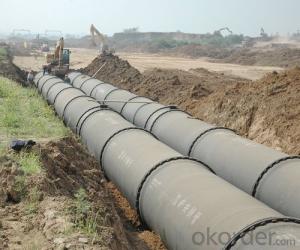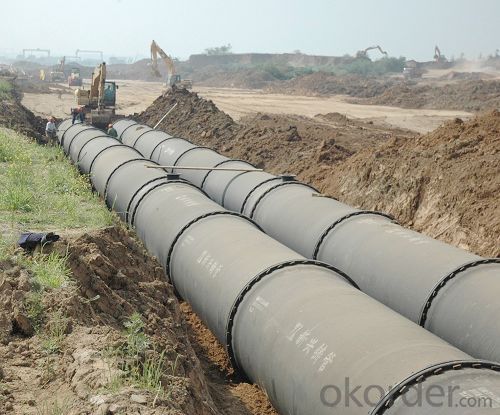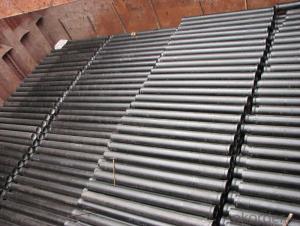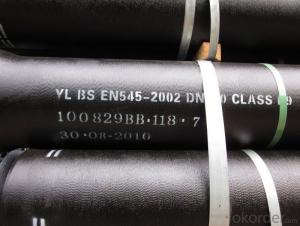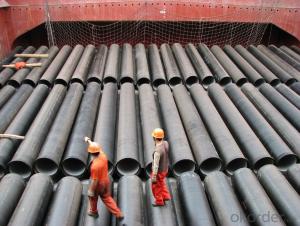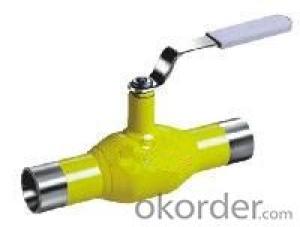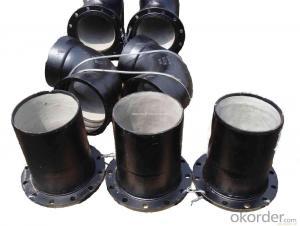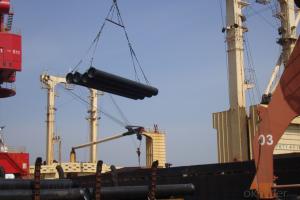Ductile Iron Pipe Professional Manufacturer
- Loading Port:
- China main port
- Payment Terms:
- TT OR LC
- Min Order Qty:
- 199 m.t.
- Supply Capability:
- 10000 m.t./month
OKorder Service Pledge
OKorder Financial Service
You Might Also Like
1,Ductile Iron Pipe Description :
1) Pipes confirm to ISO2531,K9 class,T type joint,6m long,with inside cements lining conform to ISO4179, outside Zinc spraying(130g/m2) and bitumen coating(70μm) conform to ISO8179.
2) Pipe ends: Spigot and socket ends, with 100% SBR rubber gaskets
accoding to ISO4633
3) we can do third party inspection according to customer's request.
4) Our products have been sold to many international market,
such as Middle East and South East Asia and Africa.
2,Main Features of the Ductile Iron Pipe:
·High yield strength
·High tensile Strength
·High corrosion resistance
·Anti-corrosion
·Installation is convenient
·Satisfy the highest hygienic standards
3,Ductile Iron Pipe Images:
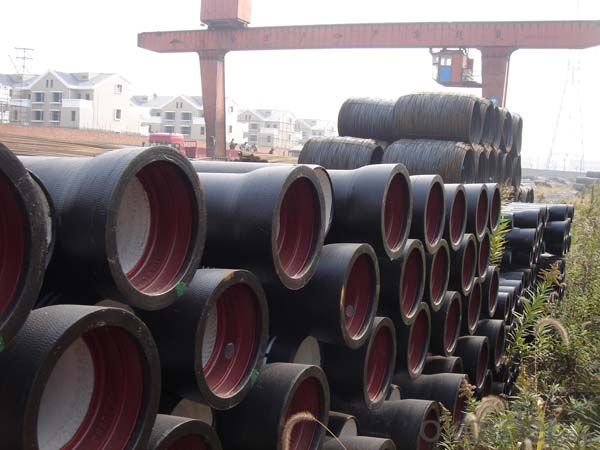
4.FAQ:
We have organized several common questions for our clients,may help you sincerely:
Q: Why would you choose ductile iron pipe rather than other pipe materials?
A:The reasons are obvious for that not only ductile iron pipe possesses the inherent strength and flexibility of ductile iron, combined with proven corrosion protection systems, but also the cost savings can be achieved from design to installation and commissioning.
Q:Why can you guarantee the inner of pipes can’t be corroded?
A: High alumina cement mortar lining and sulphate-resistant cement mortar lining. These two special linings are applicable to inner anti-corrosion for sewage pipes, improving resistance to erosion of the sewage components.
- Q: Are ductile iron pipes suitable for use in irrigation gate systems?
- Indeed, irrigation gate systems can benefit from the use of ductile iron pipes. Ductile iron, a variant of cast iron, boasts superior strength and flexibility, rendering it a reliable and long-lasting option for applications like irrigation gate systems. Ductile iron pipes are famed for their remarkable tensile strength and resistance to corrosion, features that are crucial for preserving the integrity of the irrigation system. Moreover, these pipes can endure high pressure and offer an extended lifespan, making them a cost-efficient solution for irrigation gate systems. In summary, the strength, durability, and corrosion resistance of ductile iron pipes make them highly suitable for use in irrigation gate systems.
- Q: Can ductile iron pipes be used for bridge piers?
- Bridge piers can indeed utilize ductile iron pipes. These pipes possess remarkable strength and durability, rendering them suitable for various purposes, bridge construction included. Their resistance to corrosion is exceptional, and they withstand heavy loads with ease, making them a dependable choice for supporting bridge piers. Moreover, ductile iron pipes offer convenient installation and maintenance, which can be advantageous in bridge construction endeavors. Nonetheless, it is crucial to account for the specific requirements and design specifications of the bridge prior to selecting ductile iron pipes as the material for its piers. Thorough engineering evaluation and consideration of factors like load capacity, soil conditions, and environmental elements are indispensable for guaranteeing the suitability and safety of employing ductile iron pipes for bridge piers.
- Q: Can ductile iron pipes be used in agricultural applications?
- Yes, ductile iron pipes can be used in agricultural applications. Ductile iron pipes have excellent strength and durability, making them suitable for various agricultural purposes. They can be used for irrigation systems, water supply pipelines, and drainage systems in farms and agricultural fields. Ductile iron pipes are resistant to corrosion and have a long lifespan, which is crucial for agricultural applications where the pipes are exposed to various environmental factors and chemicals. Additionally, ductile iron pipes have the ability to withstand high-pressure water flow, making them ideal for transporting water for irrigation purposes. Overall, ductile iron pipes are a reliable and efficient choice for agricultural applications due to their strength, durability, corrosion resistance, and ability to handle high-pressure water flow.
- Q: Are ductile iron pipes recyclable?
- Yes, ductile iron pipes are recyclable. They can be melted down and reused to make new pipes or other iron products.
- Q: What is the manufacturing process of ductile iron pipes? Thank you
- Made of nodular cast iron: a strict chemical composition, the content of silicon in molten iron requirements than the original carbon gray cast iron, nodular cast iron in reduced manganese, phosphorus, sulfur content of two liquid iron tapping temperature cast iron is higher than the ash, than the compensation sphere, conceived at the disposal of liquid iron temperature. Off line ball three disposal, that is to add a liquid iron ball agent four inoculation disposal of five nodular cast iron activity is poor, thus shorten the larger, higher demand for pouring temperature and pouring system larger size, more use of the riser cold iron by one condensation heat treatment criterion six iron is iron carbon alloy carbon content greater than 2%, the carbon content in ordinary industrial pig iron containing C, SI and 2.5%--4%, and Mn, S, P and other elements, is a product of iron ores in blast furnace. According to the difference in the shape of the carbon in the pig iron, it can be divided into several kinds, such as steelmaking pig iron, forging pig iron and nodular cast iron.
- Q: DN1800 can the length of ductile iron pipes be several meters? What is the total weight?
- In quality, the spheroidization of cast iron pipes is controlled to be 1-3 (spheroidization rate 80%), so the mechanical properties of the cast iron pipes, ductile iron pipes and finished product libraries can be better improved, with the nature of iron and the properties of steel.
- Q: How does ductile iron pipe perform in areas with high groundwater contamination?
- Ductile iron pipe is renowned for its durability and resistance to corrosion, rendering it an appropriate option for regions with significant groundwater pollution. By means of its protective lining and coating, the pipe effectively obstructs direct contact between the iron and groundwater, thereby minimizing the likelihood of corrosion and decay. Furthermore, ductile iron pipe possesses the capacity to withstand external pressures, making it less susceptible to harm resulting from shifting soils or groundwater flow. This characteristic proves particularly advantageous in areas with high groundwater contamination as it guarantees the pipe's structural integrity remains intact, preventing leaks or bursts. Moreover, ductile iron pipe boasts a lengthy service life, which in turn diminishes the necessity for frequent replacements and reduces the potential for groundwater pollution caused by pipe failures. On the whole, ductile iron pipe performs exceptionally well in regions plagued by high groundwater contamination, providing a dependable and robust solution for transporting water or wastewater while simultaneously safeguarding the surrounding environment.
- Q: Ductile iron pipes lined with cement mortar in the water (living water, water in the 6.9-7.3) in the early pH, why pH increased? How to solve this problem?
- 1, because of the bone in mortar, such as silicate products, there will be silicification reaction, in addition, there is the reaction of limestone in lime.2, cement mortar lining cover coating, that is, spray some paint! Some questions four are unavoidable
- Q: Can ductile iron pipe be used for marine and offshore applications?
- Ductile iron pipe is suitable for marine and offshore applications due to its high strength and durability. It is well-known for its ability to withstand demanding environments and is particularly resistant to corrosion, including the corrosive effects of saltwater and harsh marine conditions. Moreover, its ductility allows for flexibility and resistance to cracking or fracturing under high-pressure conditions. These exceptional properties make ductile iron pipe a dependable choice for transporting fluids and gases in marine and offshore industries, such as offshore oil and gas platforms, marine structures, and underwater pipelines. To further enhance the corrosion resistance of ductile iron pipes in marine and offshore applications, it is essential to utilize proper coating and cathodic protection systems.
- Q: Can ductile iron pipe be used for water distribution systems in cold climates?
- In cold climates, ductile iron pipe is an ideal choice for water distribution systems. This type of pipe is renowned for its strength and durability, making it suitable for a range of applications, including water distribution. Its exceptional ability to withstand external forces, such as freezing temperatures, frost heaving, and ground movement, is particularly advantageous in cold climates. Furthermore, ductile iron pipe exhibits a high tolerance for temperature fluctuations, ensuring its reliability for water transportation even in extreme cold conditions. Additionally, its corrosion-resistant properties guarantee the long-lasting and dependable performance of the pipe, even in harsh environments. Therefore, when it comes to water distribution systems in cold climates, ductile iron pipe is the optimal choice.
Send your message to us
Ductile Iron Pipe Professional Manufacturer
- Loading Port:
- China main port
- Payment Terms:
- TT OR LC
- Min Order Qty:
- 199 m.t.
- Supply Capability:
- 10000 m.t./month
OKorder Service Pledge
OKorder Financial Service
Similar products
Hot products
Hot Searches
Related keywords
